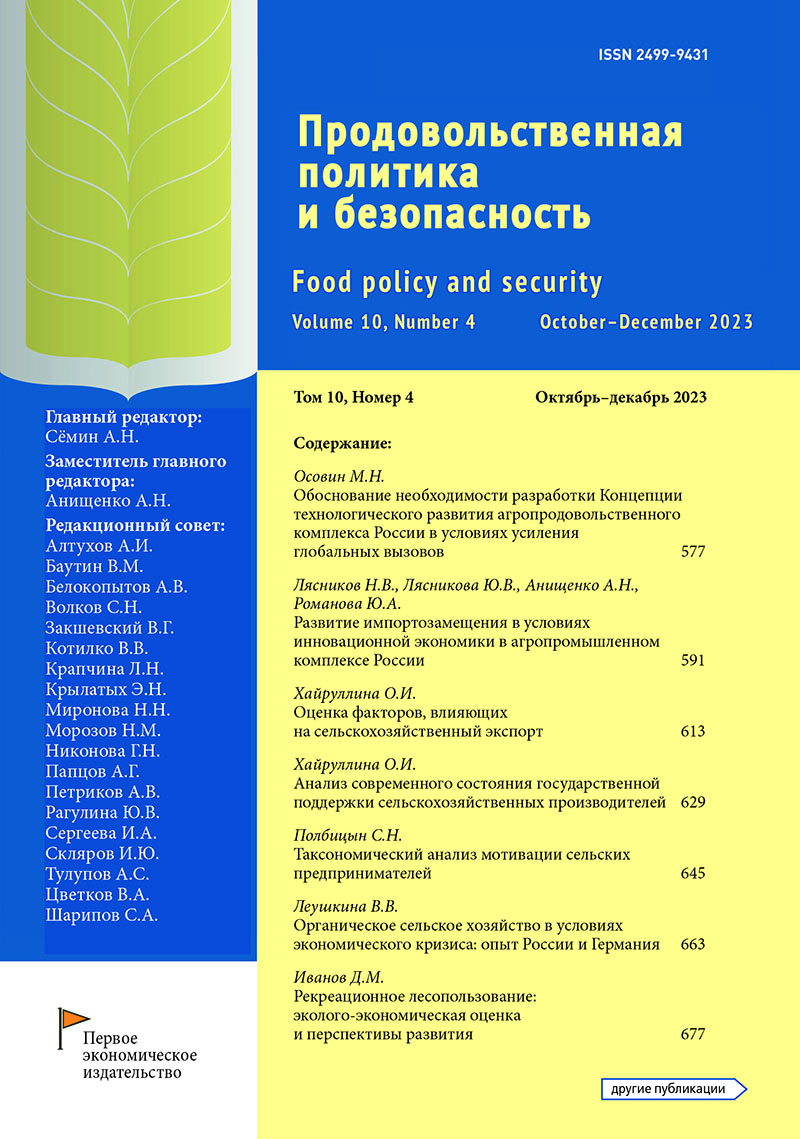Taxonomic analysis of rural businessmen's motivation
- Authors: Polbitsyn S.N.1
-
Affiliations:
- Udmurt Branch Institute of Economics of the Ural Branch of the Russian Academy of Sciences
- Issue: Vol 10, No 4 (2023)
- Pages: 645-662
- Section: Articles
- URL: https://journals.eco-vector.com/2499-9431/article/view/625276
- DOI: https://doi.org/10.18334/ppib.10.4.118944
- ID: 625276
Cite item
Abstract
Studies of motivation in rural entrepreneurship have demonstrated its positive impact on the well-being of both businessmen themselves and rural community, but little is still known about the diversity of motivation types. In this research, the authors try to answer the following question. What types of motivation of rural businessmen should be allocated not only for the purpose of researching the effective organization of support for rural businessmen, but also for the purpose of directing the businessmen's activities to those activities that can bring the greatest not only economic, but also social effect for the rural population and ensure sustainable development of rural areas? Based on the perspective of unforeseen circumstances grounded on the theory of self-determination, the authors conducted the expert study to explain the influence of motivation on the willingness of rural residents to engage in business activity. The analysis demonstrates that social motivation does not have a significant impact on the willingness to do business. At the same time, purely economic motivation has a positive impact on future businessmen.In general, the research raises questions about the need for a taxonomy of rural businessmen's motivation, which will increase the effectiveness of not only the business activities, but also government support to ensure the sustainable development of rural society.
About the authors
Sergey Nikolaevich Polbitsyn
Udmurt Branch Institute of Economics of the Ural Branch of the Russian Academy of Sciences
Email: polbitsyn.sn@uiec.ru
References
- Верховская О. Р., Александрова Е.А. Индекс мотивации предпринимательской активности и институциональная среда // Вестник Санкт-Петербургского университета. Экономика. – 2018. – № 4(34). – c. 511-533. – doi: 10.21638/spbu05.2018.402.
- Игнатова И. В. Мотивы предпринимательской деятельности и модели поведения предпринимателей // Вестник Тюменского государственного университета. – 2011. – № 8. – c. 105-110.
- Кошарная Г. Б. Мотивация современных российских предпринимателей // Известия высших учебных заведений. Поволжский регион. Общественные науки. – 2015. – № 4(36). – c. 146-154.
- Линч М. Базовые потребности и субъективное благополучие с точки зрения теории самодетерминации // Психология. Журнал Высшей школы экономики. – 2004. – № 3. – c. 137-142.
- Маслоу А. Мотивация и личность. / 3-е изд. - СПб.: Питер, 2019. – 400 c.
- Неизвестный С. И. О применении таксономии в области информационных технологий // Ученые записки Российского государственного социального университета. – 2016. – № 2(135). – c. 145-152. – doi: 10.17922/2071-5323-2016-15-2-145-152.
- Полбицын С. Н. Построение индексной модели анализа сельских предпринимательских экосистем // Экономика и предпринимательство. – 2022. – № 6(143). – c. 772-777. – doi: 10.34925/EIP.2022.143.6.14.
- Райан Р. М., Деси Э.Л. Теория самодетерминации и поддержка внутренней мотивации, социальное развитие и благополучие // Вестник Барнаульского государственного педагогического университета. – 2003. – № 3-1. – c. 97-111.
- Струк, Н. С. Таксономия сети делового партнерства предприятий // Вестник Пермского университета. Серия: Экономика. – 2013. – № 2(17). – c. 30-36.
- Тестина Я. С. Теоретические аспекты таксономии специальных видов туризма // Вестник Ассоциации ВУЗов туризма и сервиса. – 2021. – № 2. – c. 62-71.
- Чекмарев О. П. Мотивация предпринимательства в России: тенденции государственного регулирования от кризиса 2008 г. до настоящего времени // Вестник Ленинградского государственного университета им. А.С. Пушкина. – 2013. – № 3. – c. 7-21.
- Шелдон К. М. Введение в теорию самодетерминации и новые подходы к мотивации роста // Сибирский психологический журнал. – 2016. – № 62. – c. 7-17. – doi: 10.17223/17267080/62/2.
- Atkinson J.W., Birch D. Introduction to motivation. - New York: Van Nostrand, 1978.
- Birch D. The dynamics of the stream of behaviour // Journal of Mathematical Psychology. – 2009. – № 53. – p. 106-118.
- Bosworth G. Characterising rural businesses – Tales from the paperman // Journal of Rural Studies. – 2012. – № 28(4). – p. 499-506. – doi: https://doi.org/10.1016/j.jrurstud.2012.07.002.
- Busenitz, L.W. and Lau, Ch. (1995). A cross-cultural cognitive model of new venture creation. Entrepreneurship Theory Practice, 20, 25-40
- Ephrem A.N., Murimbika,. "Development and validation of an individual entrepreneurial potential new measurement scale" // Journal of Research in Marketing and Entrepreneurship. – 2023.
- García-Villaverde P. M., Ruiz-Ortega M. J., Canales J. I. Entrepreneurial orientation and the threat of imitation: the influence of upstream and downstream capabilities // European Management Journal. – 2013. – № 31(3). – p. 263-277.
- Harpe S. E. How to analyze Likert and other rating scale data // Currents in Pharmacy Teaching and Learning. – 2015. – № 7. – p. 836-850. – doi: 10.1016/j.cptl.2015.08.001.
- Kibler E., Wincent J., Kautonen T., Cacciotti G., Obschonka M. Can prosocial motivation harm entrepreneurs' subjective well-being? // Journal of Business Venturing. – 2019. – № 4. – p. 608-624.
- Lee L., Wong P.K., Foo M.D., Leung A. Entrepreneurial intentions: The influence of organizational and individual factors // Journal of Business Venturing. – 2011. – № 26. – p. 124-136.
- Naffziger D.W., Hornsby J.S., Kuratko D.F. A proposed research model of entrepreneurial motivation // Entrepreneurship Theory Practice. – 1994. – № 18. – p. 29-42.
- Norman G. Likert scales, levels of measurement and the "laws" of statistics // Advances in Health Sciences Education. – 2010. – № 15. – p. 625-632. – doi: 10.1007/s10459-010-9222-y.
- Plehn-Dujowich J. A theory of serial entrepreneurship // Small Business Economics. – 2010. – № 35. – p. 377-398.
- Polbitsyn, S., Earl, A., Bagirova, A. Kluev, A. 2020. Contemporary Issues of Rural Family Entrepreneurship: Case of Russian Indigenous Family Businesses. Proceedings of the 8th International Conference Innovation Management, Entrepreneurship and Sustainability (Imes 2020), 530-541
- Simon, H. A. (1997). Administrative behavior: A study of decision-making processes in administrative organization (4th ed.). Free Press.368 p
- Skinner, B.F. (1987). Whatever happened to psychology and the science of behaviour. American Psychologist, august, 780-786
Supplementary files









